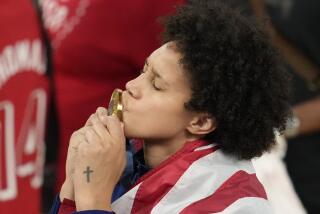BARCELONA ’92 OLYMPICS / DAY 14 : Capriati Finally Arrives : Tennis: Florida teen-ager beats Graf for gold medal and enjoys Olympic experience. It’s her first major victory.
- Share via
BARCELONA — Teen-age burnout never looked like this:
Forehand still screaming after two hours in the baking sun, the defending Wimbledon champion on the run, kiss planted upon an Olympic gold medal while American flags wave in the stands.
Teen-age burnout never sounded like this, either:
“It was so emotional, I got the chills out there. This is unbelievable. I mean, I can’t believe it. The last two weeks, I saw all the other athletes up there on the victory stand and I thought, ‘Wow, that would be so cool .’ ”
Whatever happened to Jennifer Capriati, the girl who was supposed to win Wimbledon, the U.S. Open and the French Open before the end of adolescence, the girl who had disappointed so many by failing to reach even one Grand Slam final in her 16 years?
She came to Spain, that’s what. Played around on the clay a little. Hung out at the cafeteria inside the Olympic village and met some swimmers and some rowers, which, she said, “was neat.” Got away from the expectations. Had some fun.
Then she beat Steffi Graf.
With her resolute, resilient 3-6, 6-3, 6-4 victory at Vall d’Hebron on Friday, Capriati replaced the 1988 Olympic gold medalist on the women’s singles victory stand. For all those whohad been counting and waiting, this one was major.
“It’s her first big win,” said Marty Riessen, the U.S. Olympic women’s tennis coach. “This is right there with a Grand Slam.
“How many tournaments has she won? One? Three? Nothing really big. You have to break through and win one like that--and she did it by beating the best players in the tournament--(Spaniard Arantxa) Sanchez in Barcelona (and) Graf, for the very first time.
“Winning the Olympics, the gold, that’s going to change her. The confidence she’s going to get from this is going to help her a lot.”
Help had been needed, too. She cried in the interview room after losing to Gabriela Sabatini in the Australian Open. Bound to an exhibition in Japan the next week, she balked and flew home instead.
She painted her fingernails black and began wearing skull earrings. She argued with her parents. She lost the first matches she played at Tokyo and Hilton Head, S.C., and couldn’t get past the quarterfinals at Paris or Wimbledon.
Said Riessen: “Everything that was happening to Jennifer, I would assume, comes with being 16. She did everything a normal 16-year-old does, but she happens to be in the eye of the press all the time.”
That is why Capriati winning in Barcelona, despite a career 0-4 showing against Graf, makes so much sense. For Capriati, the Olympics weren’t a pain in the summer tennis itinerary, a clay-court hassle with the hard-court season ready to open.
For Capriati, the Olympics meant meeting Carl Lewis and exchanging computer messages with Matt Biondi. It meant tickets to watch Shannon Miller on the balance beam.
“This has been the most fun I’ve ever had,” she said. “I got to meet all the athletes, take it easy with them in the training room and stuff. It’s neat.”
Relaxed and refreshed, Capriati took it all out on Graf. Despite losing the first set, 6-3, Capriati engaged Graf in an exhausting fifth game that was at deuce 13 times before Graf finally held serve.
“I was a little disappointed I couldn’t get the one point I needed there,” Capriati said, “but, actually, that game gave me confidence. If I could come out there like that and give her a hard time, coming that close to a break, she had to realize that she was going to have to serve really well today, and that put more pressure on her.”
Eventually, the pressure showed. Graf failed to hold serve three times in her last six service games, including consecutive breaks at 3-4 in the second set and to begin the third.
Capriati also minimized Graf’s forehand, which is launched with a running start. Capriati accomplished this with crisp, sharp slices to Graf’s backhand.
“Jennifer is one of the very few players who hits hard enough to do that,” Riessen said. “That kept Steffi from running around and teeing off on her forehand.”
Graf described Capriati as “very steady from the baseline, adding: “She didn’t give me a lot of errors like she sometimes does. She was very consistent, very patient, which I wasn’t, really.”
Graf was attempting to give Germany a sweep of Friday’s tennis medals. Earlier in the day, Boris Becker and Michael Stich defeated the South African team of Wayne Ferreira and Piet Norval, 7-6, 4-6, 7-6, 6-3, for the men’s doubles championship. By reaching the final, Ferreira and Norval had clinched South Africa’s first Olympic medal since 1960--a silver.
Tennis Medalists
* WOMEN’S SINGLES
GOLD: Jennifer Capriati (United States)
SILVER: Steffi Graf (Germany)
BRONZE: (tie) Arantxa Sanchez Vicario (Spain)
BRONZE Mary Joe Fernandez (United States)
* MEN’S DOUBLES
GOLD: Boris Becker and Michael Stich (Germany)
SILVER: Wayne Ferreira and Piet Norval (South Africa)
BRONZE: (tie) Goran Ivanisevic and Goran Prpic (Croatia)
BRONZE: Javier Frana and Christian Carlos Miniussi (Argentina)
More to Read
Go beyond the scoreboard
Get the latest on L.A.'s teams in the daily Sports Report newsletter.
You may occasionally receive promotional content from the Los Angeles Times.






